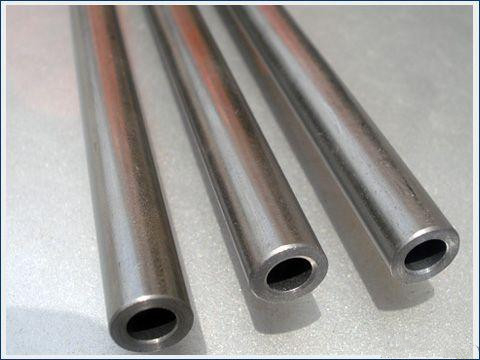Product Overview
Its robust construction and anti-vibration design make it suitable for high-performance vehicles (e.g., sports cars, heavy-duty trucks) that operate under extreme engine loads and temperature fluctuations.

Product Features
Dimensional Accuracy: Outer diameter tolerance of ±0.4 mm and wall thickness tolerance of ±5%, critical for engine compartment fit (e.g., compatible with OEM oil line connectors from BMW, Mercedes-Benz, and Volkswagen). The tube’s inner surface is polished to Ra ≤ 0.8μm via cold drawing, reducing oil flow resistance and minimizing wear on oil pumps.
Material Reliability: Made from E215 non-alloy steel (per EN 10025) with controlled manganese content (0.30–0.60%) for anti-fatigue performance—withstanding 10 million cycles of engine vibration (10–2000 Hz) without cracking. The steel also has low sulfur content (≤0.045%), preventing hydrogen embrittlement in high-temperature oil systems (up to 150℃).
Pressure Resistance: Withstands operating pressures up to 10 MPa, suitable for high-pressure fuel injection systems (common in modern diesel engines) and high-performance lubrication circuits (e.g., racing car engines with oil pressure spikes during acceleration). The tube’s burst pressure is 3x the working pressure, providing a safety margin for extreme conditions.
Surface Protection: Two coating options to prevent corrosion and oil contamination: 1) Hot-dip galvanization (zinc coating thickness 8–12μm, resists road salt and moisture); 2) Polyester powder coating (thickness 50–80μm, compatible with engine oil and fuel, no chemical reaction). Both coatings meet automotive industry standards (ISO 10289 for galvanization, ISO 12944 for powder coating).
Applications
Automotive Fuel Systems: Transfers gasoline (ethanol-blended up to E85) and diesel in passenger cars (e.g., BMW 3 Series, Toyota Camry) and commercial vehicles (e.g., Mercedes-Benz Sprinter vans). The tight tolerance ensures a secure fit with fuel injectors, preventing fuel leakage.
Lubrication Systems: Delivers engine oil to critical components like pistons, crankshafts, and camshafts in gasoline and diesel engines. The smooth inner surface reduces oil aeration, ensuring consistent lubrication to moving parts—extending engine life by 15–20%.
Heavy-Duty Vehicles: Used in trucks (e.g., Volvo FH, Scania R-series) and construction machinery (e.g., Caterpillar excavators) for hydraulic oil circuits. The galvanized coating resists dust, mud, and road salt, making it suitable for off-road and harsh weather conditions.
FAQ
Q: Does it fit European car models, and what specific OEM part numbers is it compatible with?
A: Yes, it complies with EN10305-1, matching specifications for 2018+ European models: BMW (part numbers 11427645492, 11427645493), Mercedes-Benz (A2741400183, A2741400283), and Volkswagen (06J115376A, 06J115376B). We also offer cross-referencing services to match specific OEM numbers.
Q: What is the minimum bend radius, and can it be bent without damaging the coating?
A: For 10mm OD tubes, the minimum bend radius is 25mm (cold bending) or 20mm (hot bending). Galvanized tubes can be bent without coating cracking if using a mandrel bender (prevents inner wall collapse); polyester-coated tubes require bending before coating (we offer pre-bent custom lengths to avoid coating damage).
Q: How is leak-proof performance ensured, and do you provide quality assurance for automotive use?
A: Each pipe undergoes helium leak testing (detection limit ≤ 1×10⁻⁹ Pa·m³/s) at 1.5x working pressure, and a pressure cycle test (0–10 MPa, 1000 cycles) to simulate engine operation. We are IATF 16949 certified, ensuring compliance with automotive quality management systems—all tubes come with a 3-year/100,000 km warranty for automotive use.

























